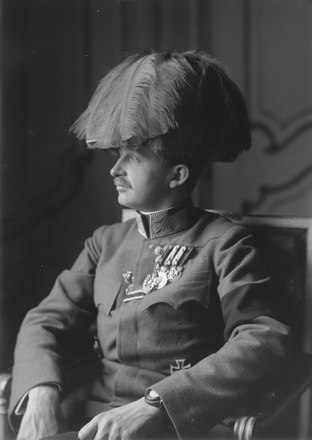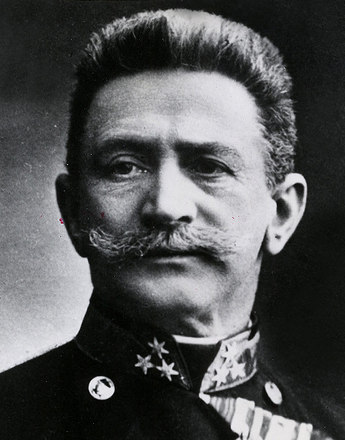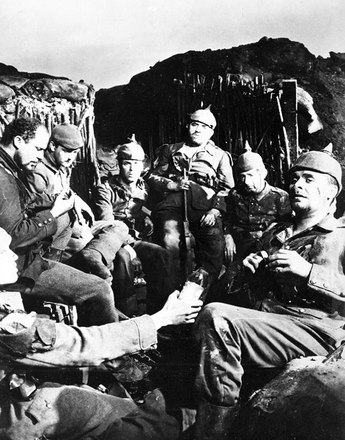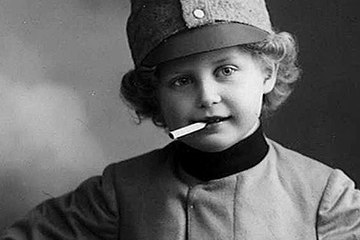-

Speech by Colonel General Franz Freiherr Conrad von Hötzendorf, head of the General Staff, sound recording, 1 November 1915
Copyright: Österreichische Mediathek
Partner: Österreichische Mediathek -

Cabaret songs on the military situation by Richard Waldemar, 1915
Copyright: Österreichische Mediathek
Partner: Österreichische Mediathek -

Speech by the heir to the throne Archduke Karl for the benefit of the Imperial-Royal Austrian Military Widows and Orphans Fund, sound recording, 16 February 1916
Copyright: Österreichische Mediathek
Partner: Österreichische Mediathek
During the First World War propaganda was acknowledged to be a crucial tool in modern warfare. Not only posters, flyers and postcards were brought out with patriotic motifs and vilifying slogans against the enemy, but also sound recordings with political speeches and propagandist pieces of music.
The military and political leaders of the Habsburg Monarchy endeavoured to convince the population of the necessity of the war and to reinforce identification with the Habsburg Empire and its military aims. In the archive of the Österreichische Mediathek is a series of eight shellac discs made by Lindström and commissioned by the k. k. Österreichischen Militär-, Witwen- und Waisenfonds (Imperial-Royal Austrian Military, Widows’ and Orphans’ Fund). This series includes a recording by Chief of General Staff Franz Freiherr (Baron) Conrad von Hötzendorf (from 1 November 1915) in which he invoked the “deep solidarity” (“innigen Zusammenschluss”) of all peoples of the Monarchy as one of the “most important phenomena of this catastrophic war” (“bedeutungsvollsten Erscheinungen des jetzigen katastrophalen Krieges”) and appealed to the sense of duty of every individual.
“Only when each and every one of us keeps to his obligations with the great goal ahead can we hope for success” (“Nur wo, mit dem großen Ziel vor Augen, jeder Teil bis zum einzelnen herab seine Schuldigkeit tut, ist der Erfolg zu erhoffen”). Conrad von Hötzendorf described the war as a catastrophe and victory as uncertain, although to be “hoped for”. In contrast to the familiar propagandist slogans invoking military superiority and certain victory, Conrad von Hötzendorf’s statement must have had a rather sobering effect.
Rather different from the chief of general staff’s statement, the appeal of the Austrian heir apparent and later Emperor Karl of 16 February 1916 was infused with optimism and trust in the fighting strength of the troops. The Archduke extolled the loyalty to the emperor and the soldiers’ “confidence in victory” and invoked the supposed positive consensus of the people of the Habsburg Empire as regards the war. “I was on all fronts, with all the troops of our glorious army. I saw all nationalities from the wide expanse of this Monarchy moving in full concord towards a great objective, a glorious peace. (“Ich war an allen Fronten, bei allen Truppen unserer glorreichen Armee. Ich sah alle Nationalitäten der weiten Monarchie in vollster Eintracht einem großen Ziele entgegengehen, einem glorreichen Frieden”). The heir to the throne praised the readiness to sacrifice themselves and the perseverance of the “heroes on the home front […], who either lost their loved ones through the war or live in constant fear and worry about their relatives.” (“Helden des Hinterlandes die durch den Krieg entweder ihr Liebstes verloren haben oder in beständiger Angst und Sorge um ihre Verwandten leben”). He closed by acknowledging the actions of the “war welfare, in which everyone who cannot defend the fatherland with sword in the hand makes every effort through endless good deeds to ease the severe suffering of all brave soldiers.” (“Kriegsfürsorge, wo jeder, der nicht selbst mit dem Schwert in der Hand das Vaterland verteidigen kann, durch unendliche Wohltaten allen braven Kriegern ihre schweren Leiden zu erleichtern bestrebt ist”).
Propagandist pieces of music were recorded as well as such speeches. The Österreichische Mediathek owns a sound recording of the famous actor and comedian Richard Waldemar, who sings a seven-verse couplet from 1915 with the title, translated, “Cabaret Songs on the Military Situation”, in which he vilifies the enemy and energetically affirms the troops’ certainty of victory. The first verse alludes to the success of the Central Powers in the Battle of Tarnov-Gorlice, when Russia was defeated in May 1915 and subsequently had to record large territorial losses. In the second verse Waldemar imitates an infantryman writing to his love, in earthy Viennese dialect:
“Du Kaderl [Katharina], wie ham wir gedroschen,
Franzosen und Engländer schwer.
Auch d’Russen ham kriagt oans auf d’Goschn,
mein Liebstes, was willst du noch mehr?”
“O Katey, what a thrashing we gave them,
the French and the English for sure.
And the Russians, too, got a gobful,
my darling, what do you want more?”
In the third verse the Russian tsar writes to the later German chief of general staff Hindenburg, in the fourth verse England to its national servicemen, in the fifth verse Nikita (Nikola) King of Montenegro, to his son-in-law Victor Emanuel III, King of Italy, and closes in the last verse with the letter of a territorial army solders who cheers up his wife with the following encouraging lines:
“Ich ergreif’ die Feder, liebes Kind,
und schreibe dir mit Bleistift und geschwind,
dass wir nach dem Schützengraben
das allerschönste Leben haben.”
“I take up the pen, my dear girl,
and write with my pencil awhirl,
after trenches and mortar
we’ll be living in butter.”
Translation: Abigail Prohaska
Alle Informationen zu den im Besitz der Mediathek befindlichen Tondokumenten entstammen der Website der Österreichischen Mediathek.
http://www.mediathek.at/virtuelles-museum/kriegstoene/cid/5393 (22.03.2014)
-
Chapters
- Propaganda: psychological warfare in the First World War
- The battle for hearts and minds.
- Friend and foe – guilt and innocence in First World War propaganda
- “Let your hearts beat for God and your fists beat the enemy”
- The First World War as reflected in the distortions of caricature
- The war on the wall
- Truth from the clouds
- The Emperor’s Voice
- Tones and Sounds







